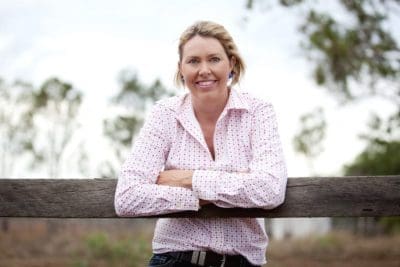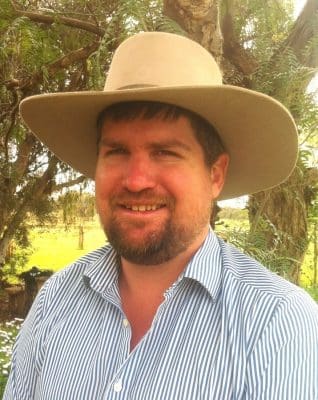LAST week’s property review (click here to view) looked at plunging property values in the wake of the Queensland Government’s vegetation management bill.
This week we continue in the second part of this study, asking whether bank confidence will be a casualty of the continuing uncertainty.
Former agri-banker Lisa Lonsdale, who now has an agribusiness consultancy business in western Queensland, is concerned the proposed legislation will affect the banks’ confidence to provide ongoing support to those who may be adversely impacted regarding carrying capacity.
“There are areas in Australia where financiers look closely before lending because of climatic conditions. What is being proposed is essentially forcing drought conditions onto these producers, so the confidence of financiers will be weighed against us,” she said. “It is wiping the balance sheet by a third or more overnight as well as reducing cash-flow for their continuing business.”

Lisa Lonsdale
Ms Lonsdale said mulga lands producers forced to stop thinning could see property prices slashed by more than 40 percent and equity positions halved.
“Carrying capacities will be reduced by a third and some producers will be forced into debt reduction to ease financial pressure. It also means capital works – to improve country to increase its sustainability – won’t happen because the cash is simply not left in the business.”
Ms Lonsdale said budgets account for commodity price and seasonal fluctuations, but they do not account for a change in legislation with dire consequences for grazing businesses.
“Producers have signed up for loans with financiers based on the carrying capacity of properties in their present state, and are legally committed to servicing debt levels for the next 15 years. They have committed to state and federal-funded loans for land development and these sustainability practices will now be limited to what they can actually achieve.”

AgForce Land valuer John Moore
Rural property valuer John Moore from Queensland farm lobby group Agforce agrees, fearing the law could alter the financial viability of a business.
“That applies particularly if a financial institution has a mortgage over the property. It could change the equity position of that business making it less sustainable and at greater risk to financial stress.”
Mr Moore believes further restrictions on fodder harvesting in mulga country will have a detriment effect on property values.
“Mulga harvesting is a major part of grazing businesses in this land system. The ability to fodder harvest makes these businesses sustainable during dry periods. The less sustainable the businesses are, the less valuable they are. This will have a wider effect on the communities in these regional and western areas where the townships rely on the agriculture sector to be sustainable,” he said.
Independent property valuer, Herron Todd White, has also expressed concern at Queensland’s vegetation bill, with rural director Tim Lane describing it as an emerging risk that would:
- Heighten the level of uncertainty within the property market by reversing the onus of proof and extending the area of impact in terms of clearing.
- Potentially stifle development and investment by influencing how potential buyers measure a property’s productivity.
- Potentially take out the development premium. For instance, a property might run x head of cattle but even with future development opportunity, that premium might be absorbed back into the market.

Lachlan Donaldson
Lachlan Dunsdon, rural and agribusiness director with property consultants and valuers Taylor Byrne, has been fielding concerns from clients across Queensland and is working with them to address their issues.
“The most common example of landholder concern is the reclassification of regrowth. We have clients from all over Queensland impacted to varying extents by this, with the most significant being in the higher value per hectare regions.”
Mr Dunsdon believes any type of uncertainty within an industry or market has the potential to dampen property demand.
“Given vegetation management is such an integral part of the productivity of most rural properties and associated value, potential purchasers will certainly be more aware and cautious of the potential effects of these proposed vegetation laws,” he said.
However, Mr Dunsdon can’t see purchasers deserting Queensland in favour of other states.
“The other states don’t offer what the Queensland market does, so buyers will be aware of the potential ramifications of these laws and will adjust their opinion of value to compensate, if applicable.”
He said the financial situation for each property will be different.
“Many properties won’t be adversely affected. However, if the productive capability of a rural property is, or will be negatively impacted by these proposed laws, then yes, there may be an associated loss of value because of their introduction.
“Any loss in value is likely to be proportionate to the loss of productivity because of the proposed laws. However, estimates of 40 to 50 percent loss in a property’s value seems extreme, and I am not aware of anyone in that situation.”
With mulga being the unique species that it is in south-west Queensland, Mr Dunsdon said the value of a property could depend on how it is managed.
“Low mulga which can be grazed in any season with no cost to the landholder is ideal. Where mulga must be mechanically felled to make it available to livestock, the associated expenses with this practice now includes greater and more repetitive application, compliance and notification costs to the landholder. Any factor, including the cost of feeding livestock that affects the profitability of a rural enterprise is likely to influence a property’s value.”

Brad James
Brad James is Rabobank’s state manager for Queensland and the Northern Territory. He said the new vegetation management rules are topical and Rabo was talking to clients about what potential impacts it might have on productivity.
“We are taking a measured approach. We will look very carefully at the effect it has on productivity going forward and the ability of producers to sustain their current position.”
He assured producers that each case would be assessed on its own merits.
“Operator management is extremely subjective. For instance, two identical properties, two different operators. One will get more out of a place than the other.
“Just like some journalists are better than others, some bankers are better than others and some lawyers are better than others. The productive capacity and sustainability of debt are different for every circumstance.
“However, one thing is for sure: if the productive capacity of a property is reduced, so to is its earning capacity. If earning capacity is reduced, so is its borrowing capacity. It’s as simple as that.”
Mr James said when a bank examines productivity, it considers whether the past can be duplicated in the future.
“Typically, banks lend against projected income by considering what has historically been achieved to see if it can be realised going forward. For example, a producer might have achieved a certain yield in the past, but going forward may have a problem continuing that. That would affect someone’s ability to borrow money.”
Mr James said banks would not use exceedingly high stocking rates recorded over three years due to good seasons, because it was not a typical representation of what was likely to be achieved going forward.
“It is going to get dry at some stage,” he said.
“Any material changes to a projected income, such as environmental or legislated, need to be considered. If they affect a property’s source of income, then, of course, that is considered when determining a producer’s borrowing capacity.”
In terms of being able to service debt, Mr James said the impact of reduced cash flow depends on the level of gearing a producer is carrying, and was quite separate to profitability.
“An operation running 2000 head of cattle hit by new vegetation management rules that restrict clearing, may have its carrying capacity reduced to 1500. If the debt generated needs to be serviced by 2000 head of cattle, then you have a problem.
“However, a moderate debt that can be serviced by 1000 head of cattle means profitability is affected, not viability.”
Mr James reminded producers that if the laws were introduced, the impact would be incremental.
“If the law was legislated tomorrow, the productivity of a property doesn’t change tomorrow. It happens over the course of a half a generation or a 10-year period. Producers pulling country to plant pasture could feel the effects in a shorter time frame – two or three years.”
“The other point to make, agriculture works on narrow margins on returns to capital investors. As a result, anything that influences a producer’s ability to generate income reflects those margins and the likely moderate return on capital,” he said.
Mr James is advising producers to:
- Get to know the legislation – what the new rules are.
- Be absolutely across what impact it will have on your place.
- Consult your legal or private counsel.
- Be aware that knowledge is power.
